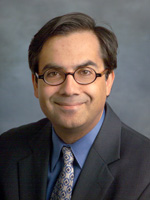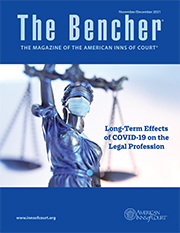Reponding to Online Criticism
The Bencher—Nov/Dec 2021
By John P. Ratnaswamy, Esquire

 As many of us spend more of our lives online, one subject that can arise with more frequency for lawyers is whether, when, or how a lawyer can or should respond to online criticism from a current or former client, particularly when the lawyer believes the criticism is false or misleading. That subject has led to numerous ethics opinions and some reported attorney discipline cases. See, e.g., In Re Conroy, 368 Or. 349 (Or. July 15, 2021) (attorney publicly reprimanded based on finding of violation of Oregon confidentiality rule in attorney’s response to a former client’s negative online review).
As many of us spend more of our lives online, one subject that can arise with more frequency for lawyers is whether, when, or how a lawyer can or should respond to online criticism from a current or former client, particularly when the lawyer believes the criticism is false or misleading. That subject has led to numerous ethics opinions and some reported attorney discipline cases. See, e.g., In Re Conroy, 368 Or. 349 (Or. July 15, 2021) (attorney publicly reprimanded based on finding of violation of Oregon confidentiality rule in attorney’s response to a former client’s negative online review).
Earlier this year, the American Bar Association’s (ABA’s) Standing Committee on Ethics and Professional Responsibility issued Formal Opinion No. 496, “Responding to Online Criticism” (Jan. 13, 2021). The ABA Standing Committee applied ABA Model Rule of Professional Conduct 1.6 (“Confidentiality of Information”). The committee concluded that (1) Model Rule 1.6(a) prohibits lawyers from disclosing information relating to a client’s representation or information that could reasonably lead to the discovery of confidential information by another, absent the client’s informed consent; (2) a negative online review, standing alone, does not meet the requirements of permissible disclosure in self-defense under Model Rule 1.6(b)(5); and (3) even if it did, an online response that discloses information relating to a client’s representation or information that could reasonably lead to the discovery of confidential information would exceed any disclosure permitted under the Model Rule. The committee noted its Formal Opinion No. 480, “Confidentiality Obligations for Lawyer Blogging and Other Public Commentary” (2018), which concluded that a lawyer, in public commentary, may not reveal information relating to a representation, including even information contained in a public record, unless authorized by a provision of the Model Rules.
Not all authorities and commentators share the same perspective on this subject. The committee, in Formal Opinion No. 496, discussed or cited many other ethics opinions and state court decisions, most of which reach the same conclusions, but some of which reflect partially different viewpoints. For example, the committee expressed its disagreement with the partially differing conclusion in Colorado Bar Association Opinion 136, “A Lawyer’s Response to a Client’s Online Public Commentary Concerning that Lawyer (2019), while distinguishing a somewhat contrary District of Columbia Ethics Opinion 370, “Social Media I: Marketing and Personal Use” (2016), as involving a confidentiality rule that is significantly different from ABA Model Rule 1.6.
The committee also offered its perspectives on best practices for lawyers facing negative online reviews. In brief, the committee suggested that a lawyer should consider (1) requesting that the hosting website remove the review (especially if the review is not from a current or former client); (2) not responding, for practical reasons; (3) attempting to address the current or former client’s concerns in a private manner, if feasible; (4) posting that the review is not from a current or former client, when that is the situation; or (5) posting that professional considerations preclude the lawyer from responding.
There appears to be a consensus that, if a lawyer is going to respond, he or she must comply with the applicable rules and should exercise caution. See, e.g., Los Angeles County Bar Association Professional Responsibility and Ethics Committee Opinion No. 525, “Ethical Duties of Lawyers in Connection with Adverse Comments Published by a Former Client” (2012), which concludes that a lawyer may respond if the rebuttal (1) does not disclose any confidential information, (2) does not injure the client in any matter involving the prior representation, and (3) is proportionate and restrained.
John Ratnaswamy, Esquire, is the founder of The Law Office of John Ratnaswamy, LLC, in Chicago, Illinois. He is an adjunct professor of legal ethics at the Northwestern University School of Law. He is a former member of the American Bar Association’s (ABA’s) Standing Committee on Ethics and Professional Responsibility and is the current chair of the ABA Solo, Small Firm, and General Practice Division’s Committee on Ethics and Professional Responsibility. This column should not be understood to represent the views of any of those entities or Ratnaswamy’s or the firm’s current or former clients.